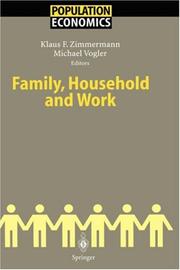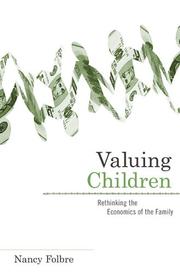| Listing 1 - 10 of 13 | << page >> |
Sort by
|
Book
ISBN: 9781922611901 Year: 2023 Publisher: Chicago : Major Street Publishing,
Abstract | Keywords | Export | Availability | Bookmark
 Loading...
Loading...Choose an application
- Reference Manager
- EndNote
- RefWorks (Direct export to RefWorks)
Book
ISBN: 044485018X 9780444850188 Year: 1977 Volume: 116 Publisher: Amsterdam: North-Holland,
Abstract | Keywords | Export | Availability | Bookmark
 Loading...
Loading...Choose an application
- Reference Manager
- EndNote
- RefWorks (Direct export to RefWorks)
Methodology of economics --- Economic sociology --- Eugenics --- Success --- Families --- Economic aspects --- Eugenics. --- Success. --- Economic aspects. --- Families - Economic aspects
Book
ISBN: 1509541357 9781509541355 1509541365 9781509541362 1509541373 Year: 2021 Publisher: Oxford Polity Press
Abstract | Keywords | Export | Availability | Bookmark
 Loading...
Loading...Choose an application
- Reference Manager
- EndNote
- RefWorks (Direct export to RefWorks)
Family relations are undergoing dramatic changes globally and locally. At the same time, certain features of family life endure. This popular book, now in a fully updated second edition, explores the growing diversity of family life and presents a comprehensive assessment of recent research on 'family', parenting, childhood and interpersonal ties.A Sociology of Family Life queries assumptions about a disintegration of 'the family' by revealing a remarkable persistence of commitment and reciprocity across cultures, within new as well as traditional family forms. Yet while new kinds of intimate relationships such as 'friends as family' and same-sex families become commonplace, such personal relationships can still be difficult to negotiate in the face of wider structural norms. With a focus on social factors such as class, gender, race and sexuality, this new edition highlights social inequalities that influence and curb families and personal life transnationally. Alongside substantial new material on cultural and digital transformations, the book features extensive updates on themes and issues ranging from demography, migration, ageing and government policies, to reproductive technologies, employment and care.With a global focus, and blending theory with real-life examples, this insightful and engaging book will remain indispensable to students across the social sciences.
Multi
ISBN: 9780521791595 9780521795395 9781139015882 0521791596 0521795397 1107720265 1107722551 1139015885 Year: 2014 Publisher: Cambridge: Cambridge university press,
Abstract | Keywords | Export | Availability | Bookmark
 Loading...
Loading...Choose an application
- Reference Manager
- EndNote
- RefWorks (Direct export to RefWorks)
The family is a complex decision unit in which partners with potentially different objectives make consumption, work, and fertility decisions. Couples marry and divorce partly based on their ability to coordinate these activities, which in turn depends on how well they are matched. This book provides a comprehensive, modern, and self-contained account of the research in the growing area of family economics. The first half of the book develops several alternative models of family decision making. Particular attention is paid to the collective model and its testable implications. The second half discusses household formation and dissolution and who marries whom. Matching models with and without frictions are analyzed and the important role of within-family transfers is explained. The implications for marriage, divorce, and fertility are discussed. The book is intended for graduate students in economics and for researchers in other fields interested in the economic approach to the family
Families --- Households --- Business and economics --- Microeconomics --- Economic aspects --- Quantitative methods in social research --- Sociology of the family. Sociology of sexuality --- Quantitative methods (economics) --- Families - Economic aspects --- Households - Economic aspects --- Economic aspects.

ISBN: 3540003606 3642624391 364255573X 9783540003601 Year: 2003 Publisher: Berlin: Springer,
Abstract | Keywords | Export | Availability | Bookmark
 Loading...
Loading...Choose an application
- Reference Manager
- EndNote
- RefWorks (Direct export to RefWorks)
During the last decades the appearance of a family has changed substantially. Not long ago a typical family consisted of an employed man and a home-managing woman living together for their whole life times, and having one or more children, which primarily were raised by the wife. Today differing living models are much more common than before. House husbands, late motherhood, and a delayed work entry of the children are some of the related phenomena, which at the same time are reasons for and consequences of the changed view on the favorite family. Not surprisingly, this change has provoked much scientific interest. In this book we present a collection of recent economic research work on the resources management and development of families and households respectively. Assorting three general topics, we focus on the time allocation within the household, the family structure and development, and the transition to work of young adults. .
Sociology of the family. Sociology of sexuality --- Families --- Family demography --- Households --- Work and family --- Economic aspects --- Population. --- Labor economics. --- Sociology. --- Population Economics. --- Labor Economics. --- Sociology, general. --- Social theory --- Social sciences --- Economics --- Human population --- Human populations --- Population growth --- Populations, Human --- Human ecology --- Sociology --- Demography --- Malthusianism --- Families - Economic aspects
Book
ISBN: 1461403812 9786613352163 1283352168 1461403820 Year: 2011 Publisher: New York : Springer,
Abstract | Keywords | Export | Availability | Bookmark
 Loading...
Loading...Choose an application
- Reference Manager
- EndNote
- RefWorks (Direct export to RefWorks)
The recent economic downturn has been especially devastating in America’s rural areas, where low wages, sporadic seasonal work, and manufacturing industries moving their plants out of the U.S. are widespread, and grocery stores and health care services may be miles away. Many families eligible for government programs are unaware of them. The transition from welfare to work is made more difficult by not only the fewer employment opportunities, and the limited access to transportation and child care which keeps many who want to work locked in a catch-22 of unemployment. Rural Families and Work analyzes in context the issues and policies that have the greatest influence on rural employment. An overview of relevant theories provides a central starting point for discussion of work and its relationship to family and community well-being. Data from the Rural Families Speak project (including interview transcripts from study participants) illustrate the range of problems preventing rural families from finding and maintaining adequate employment. In addition, the book evaluates current proposals, pinpoints future directions for research and policy, and features discussion questions to help bring work-related issues into focus. Among the topics examined in detail: The impact of TANF, EITC, and other aid programs. The challenges of child care for low-income rural mothers. Obstacles to employment: mental health problems and child health problems. The hunger-obesity paradox and other physical health issues. Social support and resource management among rural families. Food insecurity between Latino and white populations. With its in-depth framework for understanding this complex subject, Rural Families and Work is a valuable text for family relations professors and students, and a solid reference for researchers studying social policy and the economics of the family.
Rural families. --- Rural families -- Economic aspects. --- Rural families -- Economic aspects -- United States. --- Rural families --- Sociology & Social History --- Business & Economics --- Social Sciences --- Family & Marriage --- Labor & Workers' Economics --- Economic aspects --- Work and family. --- Families and work --- Family and work --- Farm families --- Social sciences. --- Social policy. --- Families. --- Families --- Psychotherapy. --- Counseling. --- Social Sciences. --- Family. --- Psychotherapy and Counseling. --- Social Policy. --- Social aspects. --- Counselling --- Helping behavior --- Psychology, Applied --- Clinical sociology --- Interviewing --- Personal coaching --- Social case work --- Psychagogy --- Therapy (Psychotherapy) --- Mental illness --- Mental health counseling --- Family --- Family life --- Family relationships --- Family structure --- Relationships, Family --- Structure, Family --- Social institutions --- Birth order --- Domestic relations --- Home --- Households --- Kinship --- Marriage --- Matriarchy --- Parenthood --- Patriarchy --- National planning --- State planning --- Economic policy --- Family policy --- Social history --- Behavioral sciences --- Human sciences --- Sciences, Social --- Social science --- Social studies --- Civilization --- Treatment --- Social aspects --- Social conditions --- Dual-career families --- Work-life balance --- Applied psychology. --- Applied psychology --- Psychology, Practical --- Social psychotechnics --- Psychology --- Families—Social aspects.

ISBN: 0674033647 0674037022 9780674037021 9780674026322 0674026322 9780674033641 9780674047273 0674047273 0674263510 9780674263512 Year: 2008 Publisher: Cambridge, Mass. Harvard University Press
Abstract | Keywords | Export | Availability | Bookmark
 Loading...
Loading...Choose an application
- Reference Manager
- EndNote
- RefWorks (Direct export to RefWorks)
While parents spend significant time as well as money on children, most estimates of the "cost" of children ignore the value of this time. Folbre provides a startlingly high but entirely credible estimate of the value of parental time per child by asking what it would cost to purchase a comparable substitute for it.
Families --- Child rearing --- Households --- Family allowances --- Allowances, Family --- Child benefit --- Child endowment --- Family endowment --- Family wages --- Cost and standard of living --- Economic security --- Mothers' pensions --- Wages --- Income maintenance programs --- Population --- Home economics --- Child raising --- Children --- Raising of children --- Rearing of children --- Training of children --- Child care --- Economic aspects --- Development and guidance --- Management --- Training --- Families - Economic aspects - United States --- Child rearing - Economic aspects - United States --- Households - Economic aspects - United States --- Family allowances - United States

ISBN: 2130414265 9782130414261 Year: 1988 Publisher: Paris: PUF,
Abstract | Keywords | Export | Availability | Bookmark
 Loading...
Loading...Choose an application
- Reference Manager
- EndNote
- RefWorks (Direct export to RefWorks)
Family law. Inheritance law --- Sociology of the family. Sociology of sexuality --- Marriage --- Families --- Mariage --- Familles --- --Économie --- --France --- --Marriage --- Family demography --- Economic aspects --- Family --- #SBIB:39A11 --- #SBIB:316.356.2H3200 --- -Family --- -Family demography --- -Demography --- Family life --- Family relationships --- Family structure --- Relationships, Family --- Structure, Family --- Social institutions --- Birth order --- Domestic relations --- Home --- Households --- Kinship --- Matriarchy --- Parenthood --- Patriarchy --- Married life --- Matrimony --- Nuptiality --- Wedlock --- Love --- Sacraments --- Betrothal --- Courtship --- Honeymoons --- Antropologie : socio-politieke structuren en relaties --- Partnerkeuze: algemeen --- -Economic aspects --- -Research --- Social aspects --- Social conditions --- -Antropologie : socio-politieke structuren en relaties --- -Families --- Demography --- Research --- Économie --- Marriage - Economic aspects - France --- Families - Economic aspects - France --- Family demography - France --- France --- Marriage - Economic aspects - France. --- Family - Economic aspects - France. --- Family demography - France.
Book
ISBN: 9782348044380 2348044382 Year: 2020 Publisher: Paris: La Découverte,
Abstract | Keywords | Export | Availability | Bookmark
 Loading...
Loading...Choose an application
- Reference Manager
- EndNote
- RefWorks (Direct export to RefWorks)
On sait que le capitalisme au XXIe siècle est synonyme d'inégalités grandissantes entre les classes sociales. Ce que l'on sait moins, c'est que l'inégalité de richesse entre les hommes et les femmes augmente aussi, malgré des droits formellement égaux et la croyance selon laquelle, en accédant au marché du travail, les femmes auraient gagné leur autonomie. Pour comprendre pourquoi, il faut regarder ce qui se passe dans les familles, qui accumulent et transmettent le capital économique afin de consolider leur position sociale d'une génération à la suivante. Conjointes et conjoints, frères et sœurs, pères et mères n'occupent pas les mêmes positions dans les stratégies familiales de reproduction, et n'en tirent pas les mêmes bénéfices. Fruit de vingt ans de recherches, ce livre montre que le capital a un genre. Céline Bessière et Sibylle Gollac enquêtent sur les calculs, les partages et les conflits qui ont lieu au moment des séparations conjugales et des héritages, avec le concours des professions du droit. Des mères isolées du mouvement des Gilets jaunes au divorce de Jeff et MacKenzie Bezos, des transmissions de petites entreprises à l'héritage de Johnny Hallyday, les mécanismes de contrôle et de distribution du capital varient selon les classes sociales, mais aboutissent toujours à la dépossession des femmes. Ce livre analyse ainsi comment la société de classes se reproduit grâce à l'appropriation masculine du capital.
Women --- Inheritance and succession --- Sex discrimination in economics --- Families --- Feminist economics. --- Economic conditions. --- Social aspects --- Economic aspects --- Inégalité sociale. --- Relations hommes-femmes --- Études sur le genre. --- Capitalisme. --- Successions et héritages. --- Sociologie juridique. --- Aspect économique. --- Discrimination sexuelle. --- Successions et héritages --- Famille. --- Aspect social --- 339.21 --- 332.225 --- 332.71 --- 172 --- Ongelijkheid en herverdeling van vermogens en inkomens. Inkomensbeleid --- Vrouwenlonen --- Vrouwen- en jongerenarbeid --- Gezinsmoraal. Huwelijk. Echtscheiding --- Women - France - Economic conditions. --- Inheritance and succession - Social aspects - France. --- Sex discrimination in economics - France. --- Families - Economic aspects - France. --- Capitalisme --- Femme --- Famille --- Etude de genre --- 340 --- economie --- économie --- Feminist economics
Book
ISSN: 19627505 ISBN: 9782713222283 2713222281 2713231930 9782713231933 Year: 2009 Volume: 11 Publisher: Paris: Éditions de l'EHESS,
Abstract | Keywords | Export | Availability | Bookmark
 Loading...
Loading...Choose an application
- Reference Manager
- EndNote
- RefWorks (Direct export to RefWorks)
Sheds light on the challenges of reforms that need to be carried out in France which is facing an aging population. Analyzes the future prospects of the French welfare state.
Intergenerational relations --- Generational accounting --- Families --- Family policy --- Relations entre générations --- Comptabilité par génération --- Familles --- Politique familiale --- Economic aspects --- Social aspects --- Aspect économique --- Aspect social --- AA / International- internationaal --- FR / France - Frankrijk --- 339.21 --- 339.325.0 --- 202 --- 172 --- 347.60 --- Ongelijkheid en herverdeling van vermogens en inkomens. Inkomensbeleid. --- Levensstandaard en verbruikspeil (algemeenheden). --- Sociale organisatie. --- Gezinsmoraal. Huwelijk. Echtscheiding. --- Familierecht.Erfopvolgingen (algemeenheden). --- Relations entre générations --- Comptabilité par génération --- Aspect économique --- Family --- Family life --- Family relationships --- Family structure --- Relationships, Family --- Structure, Family --- Social institutions --- Birth order --- Domestic relations --- Home --- Households --- Kinship --- Marriage --- Matriarchy --- Parenthood --- Patriarchy --- Intergenerational relationships --- Relations, Intergenerational --- Relationships, Intergenerational --- Interpersonal relations --- Gezinsmoraal. Huwelijk. Echtscheiding --- Sociale organisatie --- Ongelijkheid en herverdeling van vermogens en inkomens. Inkomensbeleid --- Levensstandaard en verbruikspeil (algemeenheden) --- Familierecht.Erfopvolgingen (algemeenheden) --- Social conditions --- Intergenerational relations - Economic aspects - France --- Families - Economic aspects - France --- Family policy - France --- relations intergénérationnelles --- État-providence --- intervention publique --- vieillissement --- Statistiques commerciales --- Europe
| Listing 1 - 10 of 13 | << page >> |
Sort by
|

 Search
Search Feedback
Feedback About UniCat
About UniCat  Help
Help News
News